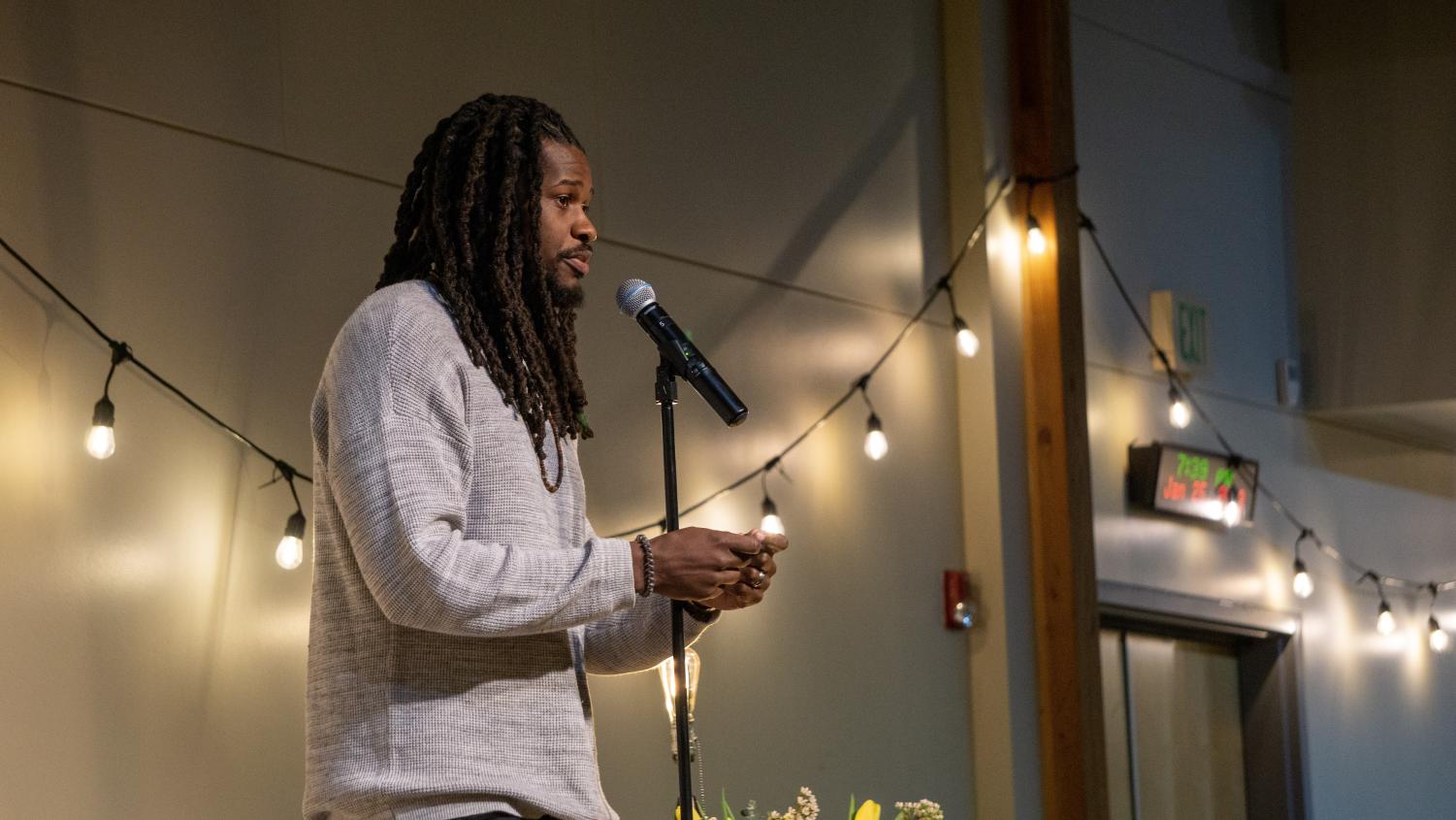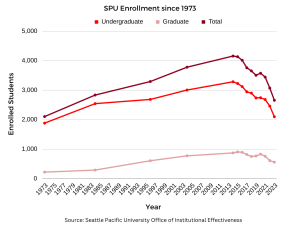Reconciliation through communion
Students attend poet and minister Lo Alaman’s keynote address on art and Christianity
February 1, 2023

This year for Seattle Pacific University’s 20th annual Day of Common Learning, Lo Alaman, a nationally renowned spoken-word poet and minister, gave an hour-long keynote address to bleachers of students, staff and faculty at 10 a.m. on Jan. 25 in Royal Brougham Pavilion.
The Day of Common Learning is a university-led event with the purpose of providing students with accessible exposure to the world outside the campus through various speakers and workshops. In past years, SPU has asked scholars, government officials and other academically-acclaimed voices to speak about that year’s topic.
Junior mechanical engineering major Abigail Young gave praise to the university for providing a variety of perspectives on Christianity in their speakers through the years but was worried that Alaman would hold no novelty.
“I did not know what I was walking into … as soon as he cracked that first joke I knew it was going to be good, he had a very warm energy,” Young said. “Listening to Lo was like a breath of fresh air. He has a different perspective [on Christianity]. It’s a perspective that I relate to and quite frankly enjoy because what he represents is that being Christian isn’t perfect, and I think that’s something that should be emphasized within our community, especially within the SPU community.”
While students’ thoughts on the event varied in overall impression, they seemed to agree on the welcomed conversational aspect of Alaman’s address. Senior dietetics major Abigail Brown saw a clear difference in the tone and deliverance of Alaman’s address compared to past years.
“I thought Lo’s keynote speech was interesting compared to other keynote speakers because it didn’t feel like a keynote address, it felt very much like a sermon or a church message. Whereas, with other keynotes, it feels more like a TED talk on something that they’ve devoted research to,” Brown said. “I was really excited to hear Lo’s take on art and faith, and I don’t think I got that out of his address. I wish it had been more focused on his area that he specializes in.”
During his keynote speech, Alaman provided an engaging perspective on Christian morality and continued to expand on this during an interview with The Falcon. He suggested that the combination of viewing the Bible as a rulebook to follow a certain Christian moral code and therefore escape persecution can lead to an idea of formulaic religion. Allaman suggests that this interpretation is only part of the whole.
“It’s not that I was wrong, but that [my perspective] was incomplete. I can’t find this God that wants to send me to heaven, but I see very consistently this God that wants to bring his Kingdom of Heaven closer to me,” Alaman said. “Communion becomes much more the point when I just read it for how it wants to be read as opposed to trying to put my interpretation on it.”
When asked how followers of Christ can stay true to the teachings of Jesus while combating systems of power, especially when that power is said to be in the name of God, Alaman said to embrace our inherent humanity.
“The letter that Jeremiah wrote to the exiles in Babylon is very formative for us, especially in chapter 29. His encouragement is that when you are the minority in a community, try to hold fast to the teachings of Yahweh and try to be a countermeasure in a space that is socially engineered to change you,” Alaman said. “The best approach to garden … to pray for the city … to live an abundant life.”
Alaman explained how this approach has been used historically.
“The main attempt of dehumanizing black bodies was to separate families. If I can separate you from your family … this furthers the idea that you are not connected to anything. The most productive thing I can do to push back against the culture that is trying to dehumanize me is to authentically be as human as possible,” Alaman said. “The most powerful and profound response to that [the old ways of wearing Christianity being forced on a community] is to continue to be more human than the opposition [the lost] thinks you are.”
Much of Alaman’s poetry and prose consists of his thoughts and approaches to the intersection of social justice and faith. When asked about the recent lawsuit against SPU’s board of trustees brought on by a group of students, staff and faculty, Alaman provided his perspective on how best to reconcile the contention within our community.
“My argument would not be for either side of an argument, my argument would be for if Christ is central. When Jesus becomes the standard, I would say it keeps the bond of peace. It creates this harmonious nature, not a homogeneous nature, harmonious. It creates oneness over sameness,” Alaman said. “If [someone] doesn’t see it your way, then your intention is not to condemn them but to pray for them. It is to ask God, ‘give them vision, not for my own view, but for you.’”
Alaman ended with a few final words of advice on the subject.
“The invitation is to follow Jesus … there are times when Jesus says to pick up the sword and there are times when he says to put it down,” Alaman said.
Alaman ended his time at SPU by participating in an open mic event in Upper Gwinn later that night. Students, faculty and staff were gathered to share and commune in the spiritual art of spoken-word poetry.

























































































